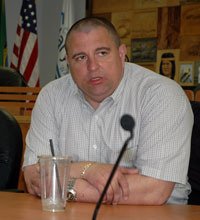MARYSVILLE — Officials for the city of Marysville and the Tulalip Tribes showed their solidarity with Citizens for a Smell Free Snohomish County by calling for a determination of significance and an environmental impact statement from the city of Everett and the Puget Sound Clear Air Agency on Cedar Grove’s Smith Island composting facility in Everett.
After submitting letters to those lead agencies on April 5 and 6, Marysville Mayor Jon Nehring and Tulalip Tribes Chair Mel Sheldon Jr. were joined by other city and tribal officials in the Marysville City Council Chambers on Tuesday, April 24, as they met with the press to voice their concerns about Cedar Grove’s shoreline substantial development permit application.
“We’re not against composting and we’re not looking to shut Cedar Grove down,” Nehring said. “We’d love to deal with this business, as long as it’s doing its business responsibly.”
Nehring asserted that Cedar Grove’s Smith Island composting facility has failed to bring its operations into compliance with permit conditions laid down nearly nine years ago, and pointed to Cedar Grove’s own research data as showing that it had exceeded its odor threshold, which was the issue that inspired Marysville’s Mike Davis to found Citizens for a Smell Free Snohomish County.
Nehring addressed the economic impacts on Marysville from the foul odors that he reported smelling himself. Sheldon echoed these complaints by noting that, just as the city of Marysville is striving to revitalize its downtown businesses, so too do the Tulalip Tribes depend heavily on tourist revenues which would likewise be impacted by smells that make it less pleasant for people to shop and walk outside.
“Tulalip has a biogas plant in Monroe, where we work with the local farmers in a positive way, so we understand the challenges of alternative energy,” said Sheldon, who also worries about the possible impacts of toxins on tribal harvests of salmon, crab and shrimp.
For Quil Ceda Village General Manager Steve Gobin, the smell that generated more than 700 recorded complaints from around the area last summer is not just a possible blow to his merchants, but also an immediate nuisance in his backyard.
“I live just half a mile upstream from that facility,” Gobin said. “We can’t go outside to barbecue or enjoy our yard. It’s already affecting the Quil Ceda Creek Casino. Cedar Grove hired its own study group, and when citizens complained, they sent their paid people around to tell you that you didn’t smell what you thought you did.”
City of Marysville Chief Administrative Officer Gloria Hirashima agreed with Nehring and Sheldon’s characterization of Cedar Grove as an essentially unregulated utility, given the poor coordination and boundaries between the regulating agencies.
“We don’t think it’s malicious as much as it is a lack of clear oversight,” said Hirashima, who had learned a succession of citizens’ groups had been formed and eventually dissolved well before Davis’ group started up three years ago. “They all ultimately gave up and we started asking ourselves whether we could continue on with this.”
Davis expressed his gratitude to the Marysville and Tulalip governments for their support, and took issue with the degree to which Cedar Grove’s composting remains uncovered.
“It’s easier for them to pay the fines and negotiate them down,” Davis said. “This is affecting our quality of life. I’d rather be making money than doing this.”
Laird Harris, spokesperson for Cedar Grove, contended that the reviews by the city of Everett and the Puget Sound Clear Air Agency were already very thorough.
“Studies have shown no environmental impact or increase in odors,” Harris said. “Our mitigations will actually improve the wetlands activity.”



